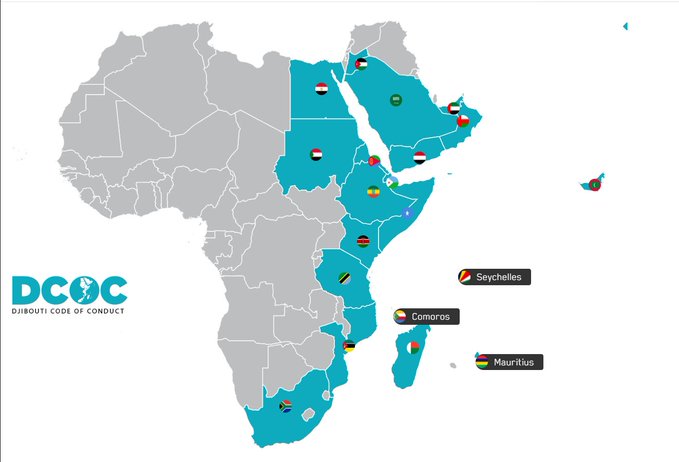Djibouti Code of Conduct – Call for action on attacks against International Shipping in the Red Sea
The Signatory States to the Code of Conduct concerning the Repression of Piracy and Armed Robbery against ships in the Western Indian Ocean and the Gulf of Aden (the Djibouti Code of Conduct) and the Jeddah Amendment to the Djibouti Code of Conduct, 2017 (DCoC/JA) fully support the statement of His Excellency Mr. Arsenio Dominguez, Secretary-General of the International Maritime Organization (IMO), to the United Nations Security Council on maritime security challenges along the vital shipping lane of the Red Sea¹.
In his statement, Mr. Dominguez strongly condemned attacks against international shipping in the Red Sea area, while reiterating the commitment of IMO to protect seafarers, ships and cargoes to ensure the safety and security of global supply chains. He further encouraged the Member States to “use the DCoC as a forum to ensure communication among all countries in the region and as a practical exercise in following measures of safety of navigation encouraged ships to continue sending initial reports when entering the voluntary reporting area to the United Kingdom Maritime Trade Operations (UKMTO) centre and all relevant centres in the region to enhance safety of navigation.”
In response to the IMO Secretary-General’s statement and consistent with the outcomes of an extraordinary meeting of DCoC National Focal Points and international partners held on 18 December 2023² to formulate a regionally supported response, the DCoC Steering Committee reiterates its press release of 19 December 2023³ and emphasizes the need for the regional States and international partners to follow through on the recommendations of the extraordinary meeting. Among the key outcomes was an agreement to request the United Nations Security Council to “act with resolution on this matter in the same way that it addressed piracy off the coast of Somalia, including calling for additional naval units to provide security in the area”. Such action may include the adoption of a Security Council Resolution, as appropriate.
A clear lead by the Security Council could also further encourage signatory States to take positive actions consistent with the provisions of the DCoC/JA. Such actions could include:
- Addressing the resurgence of piracy: Promoting counter-piracy initiatives, for example, all ships calling in DCoC ports and intending to transit the western Indian Ocean, Gulf of Aden and Red Sea area should be visited and advised to implement self-protection measures in accordance with IMO guidance and Best Management Practices. As indicated in the IMO Secretary-General’s statement, this should also include registering with MSCHOA, UKMTO Dubai and other centres.
- Increased maritime presence: Signatory States with significant naval capability would be encouraged to contribute assets to area defence and air defence efforts, ideally in support of a Security Council resolution. As part of a wider DCoC/JA project, funding should be sought to further develop the capabilities of littoral States maritime law enforcement capabilities, for example the Maritime Police Forces in Somalia and the Yemen Coast Guard. It is important that these local units be equipped, trained and be competent. If properly trained and equipped, they can also contribute to regional situational awareness. Although few regional navies have a significant anti air capability, most could provide escorts or a presence in the extended IRTC that could deter or head off surface attacks including WBIEDs.
- Self-Protection measures in ports; Given that the stated aim is the disruption of shipping, it would be reasonable to assume that attacks in ports are also being considered by the perpetrators. Signatory States need to implement a greater level of interagency cooperation, ISPS Code implementation and general resilience. Signatory States also need to clarify their regulations with respect to the loading, offloading and transit of armed security teams and their equipment.
- Denial of weapons to the Perpetrators; Given the numbers of missiles and drones being used, there is need to strengthen the UNVIM Program to ensure effectiveness. In addition, DCoC signatory States should be encouraged to enhance their customs checks and border controls to deter weapons smuggling.
The Steering Committee believes that the above actions are consistent with the spirit and provisions of the DCoC/JA and will ensure that the Signatory States and the DCoC/JA are at the forefront of providing regional solutions to help address the current crisis pending a longer-term solution. The DCoC remains at the forefront of providing regional solutions to regional challenges, based on their primary areas of maritime law enforcement, security, and the safety of navigation.
1 See video here: https://www.youtube.com/watch?v=9rK9pR5cDTE&t=2s
2 The meeting report is at: https://dcoc.org/wp-content/uploads/report-of-dcoc-ja-extraordinary-meetingon-red-sea-threats-held-on-18-december-2023-via-teams.pdf




